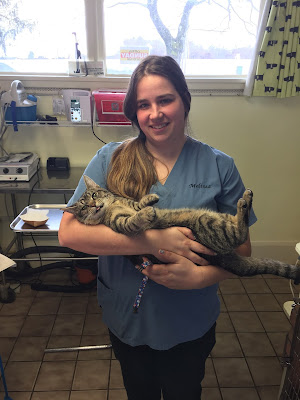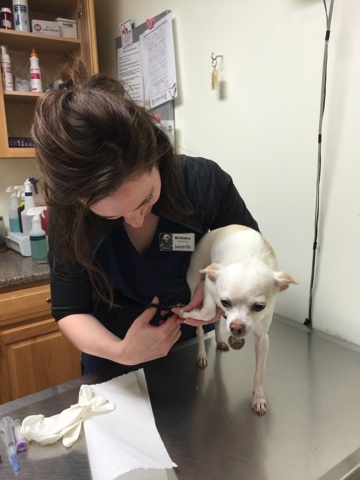 |
| Beasely and family. |
1. "What would you do if this was your pet?"
You are asking ME what I would do? Like, I, as in, imagine I am YOU? or, I, as in, ME?
a. trusting in your vet,
b. confusion about what to do, and
c. humility in truly not knowing what to do,
I have to openly say that this is an answer fraught with slippery problems and impossible answers.
Here's why; Everyone sees their pet differently. Some are family members, others are guardians, service pets, lifelines, companions, and even alarm systems. There are also some cases where the disease/recovery/treatment, etc. is so labor intense or costly that some people are either physically or financially unable to provide it.
Let's be honest, I am not YOU.. My abilities as an able bodied trained veterinarian are not the same as yours. Asking me to presume what you can do, are healthy enough to do, financially stable enough to manage, or mentally prepared for if the dice decide to change midway through the plan is impossible for me to gauge, guess, or presume? Life, medicine, and all of the requirements that need to align for best case scenario don't always happen. There is not a feasible answer to this question that I can provide for you. It has to be your decision. Coersion, dismissal, and whatever all of the rest of the possibilities may be are yours to pay for, live with, and decide. You know your pet best. You are their advocate and you are their whole entire world.
And as for ME? What do I DO? For my friends and clients who ask because they know and trust me I provide this personal answer; "I am crazy. I am. I am over protective, able bodied, and weathered. I will live on rice and beans so that I can take care of my pets. There was a time when I had no job, no income, no car, little food, and 12 cats. Yep 12! I am crazy. I would do anything it takes to keep my pets alive for one more day. I can let them go in the quiet privacy of my home at 1:30 am after the last seizure incapacitates them. I believe in hospice care, I believe in there being beauty in the preservation of life, and I feel deep responsibility to protect and provide beyond the point of "quality of life as based on pennies in a "good day" or "bad day" jar." And, you want me to make a decision of this magnitude for you?
Points to consider when you ask your vet our opinion on what to do with your pets care;
- Every vet has more access to more information to permit us to make easier decisions. It is the inherent nature of our profession.
- We have a breadth of previous experiences to permit us to make easier decisions with respect to our own pets health care decisions. We love our pets just as much as our clients do, but, we have accepted that life and death duel without established rules of conduct.
- I also think that there are too many vets who feel that it is easier if "you elect to euthanize." There is no liability in you electing to euthanize. We provide the options; you make a decision. The fault and blame lies squarely on your shoulders. My fear is that euthanasia is the one option we face the least litigation and backlash for. In most cases vets have to guess and prognosticate and we often have to do so with little to no data to support it. We make too many diagnoses without confirmatory data to support them. We are scientists who deny anthropomorphism and simultaneously overuse the noun "suffering" as a way to mediate our patients status. Our task is to relieve this suffering and we too often use euthanasia as our tool to assist. In many cases lack of fiances dictates this as the only available option.
- You must be brave enough, love enough, and be selfless enough to make a hard decision. We cannot, nor should we ever, presume to know what kind of regret, pain, or suffering taking away your decision might cause you.
 |
| Raven |
While there is no argument with the fact that some diseases and some conditions are expensive to treat, (and that some may not even be treatable), we veterinarians are here to help your pet live longer, healthier and happier lives. Pet care and your veterinarians devotion to all of the years it takes to understand, heal, and help provide these, and, replacement value is the basis for a decision? Loving anything is not an economic equation. Your vet is probably a vet because they love pets and asking us to make an economic decision on a patient that most of us see as a family member is tantamount to reminding us that the emotional tie to pets is negligible. Don't ask this! We probably already know you are heartless, don't provide us with quotes to place as a reference.
 |
| Lucy |
3. "I don't want to pay for stuff (vaccines/diagnostics) that I don't need?"
Does anyone? Ever? Veterinarians are not able to foretell your pets future. We have to use our experience and training to provide you all of the best advice and pearls of our practice to help you understand what is in the best interest of your pet. There are numerous professional advisory panels to help us provide these recommendations. If you are ever skeptical, or want to make your own informed pet care decisions, utilize them. They include; AAHA, AVMA, AAFP, AHS, and each of the veterinary specialty colleges.
 |
| Weasely and Thor |
They are "that way" because some human failed them: True. But they are also "this way" because you didn't train them to know otherwise. Behavior problems are ubiquitous. They often do not improve with age, time, or all of the small concessions to avoid eliciting them that protective pet parents provide. The first sign of any troublesome action or reaction should be discussed with your vet. Please don't wait until someone is bitten, or you are unable to care for them in a safe and calm environment. The excuse that someone else bears responsibility for poor behavior is not a justification to not resolving it.
 |
| Linus |
"My reply, "I don't believe in not protecting your pet from treatable or preventable diseases."
Ultimately you, the pet parent, are responsible for your pets care and health. You are also legally responsible and will be held accountable if a required vaccine is not given and a human being suffers because of it. I am specifically talking about rabies. I will, and do, advocate others, including helping clients to understand their complacency and culpability if they refuse to vaccinate, fail to protect, and dismiss the consequences of breaking the laws in place to protect us all.
People often ask me if euthanizing an elderly pet dying of natural causes is the worst part or my job? No, it isn't. It is hard, sad, and difficult, yes, but, watching a pet die from a preventable disease, that's worse.
 |
| Kitten intake crew |
6. "I don't want to put them through, XXXX procedure."
Treating your pets disease, infection, trauma, etc is only accomplished through the care given by your vet and support staff. Denying that is a conscious decision to let fate have the upper hand. It is complacency, who is the nemesis to medicine and science. Utilize the tools and resources of your pets medical professionals at every opportunity you can.
Why are we willing to fix a broken bone but not remove a cancerous lesion? It is important to educate clients on how our patients are different from ourselves in both response to care and recovery. Losing a leg to whatever does not change who your dog is, nor does it change their ability to get up the next day and seize the joy they find. There are so many important lessons our pets have to teach us; one of the most important ones is that they can recover, thrive, and often prove to be far more resilient than anyone imagines. The point is that it takes time, attention, medical care and intervention to get them there. Too often the excuse "I don't want to put them through, whatever, " is a shirk to deny a second chance. Fight and work to protect life it is our single greatest gift to each other. And, lastly remember, our goal is to get your pet back to being happy and well. We don't want to put them through anything that isn't beneficial either. Ask us if the short term treatment plan is worth the long term gain. We will be honest with you.
 |
| Mallard |
What the hell? I can only dignify this question with that response,, (and a few expletives, finger gestures, and a reminder to try to not say or do any of them in public).
I am a small animal veterinarian at Jarrettsville Veterinary Center in Harford County Maryland. I can be reached at the clinic, on Facebook, on Twitter @FreePetAdvice, YouTube, and for free questions and pet advice on Pawbly.com. If you are a pet professional or advocate, please join me on Pawbly.com. We are a free online community dedicated to helping pets and their people thrive.















































